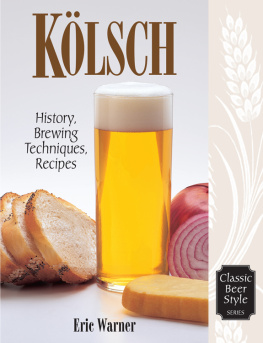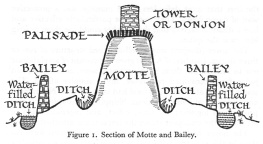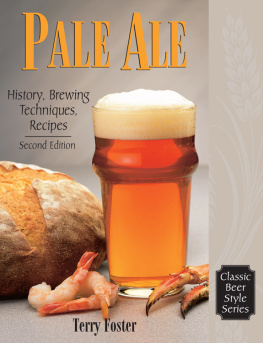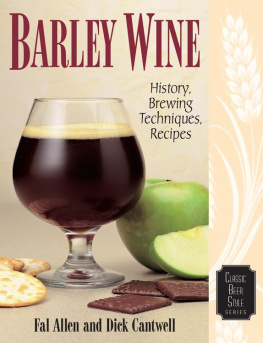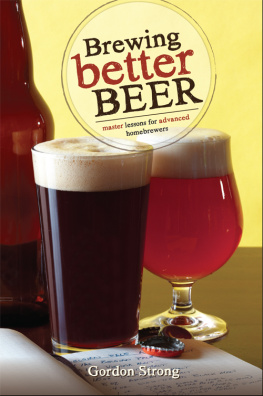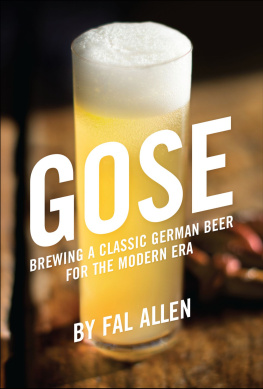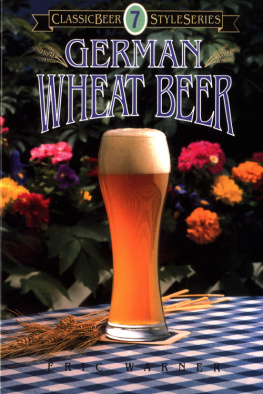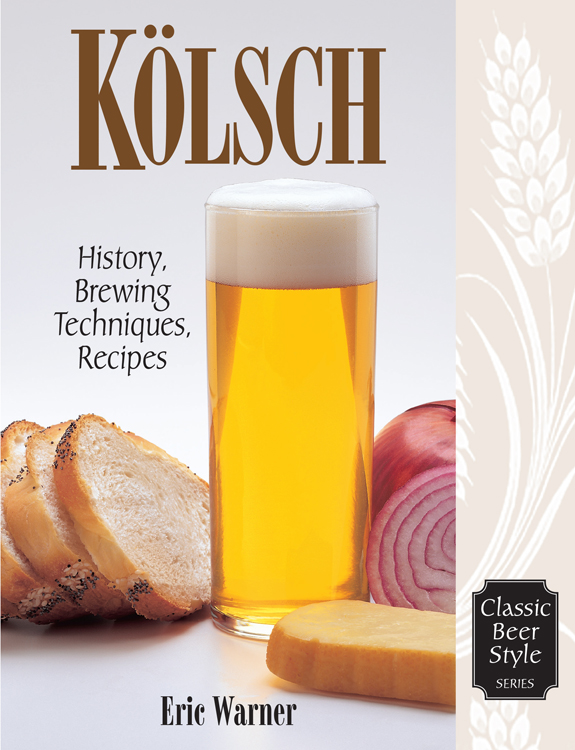The Classic Beer Style Series is devoted to offering in-depth information on world-class styles by exploring their history, flavor profiles, brewing methods, recipes, and ingredients.
K LSCH
History, Brewing Techniques, Recipes
Eric Warner
Classic Beer Style
Series no. 13

A Division of the Brewers Association
Boulder, Colorado
Brewers Publications, Division of the Brewers Association
PO Box 1679, Boulder, CO 80306-1679
(303) 447-0816; Fax (303) 447-2825
BrewersAssociation.org
1998 by Eric Warner
All rights reserved. Except for use in a review, no portion of this book may be reproduced in any form without written permission of the publisher. Neither the author, editors, nor the publisher assumes any responsibility for the use or misuse of information contained in this book.
ISBN-13: 978-0-937381-58-8
ISBN-10: 0-937381-58-6
EISBN: 978-1-938469-29-9
Please direct all inquiries or orders to the above address.
Library of Congress Cataloging-in-Publication Data
Warner, Eric
Klsch : history, brewing techniques, recipes / Eric Warner.
p. cm. (Classic beer style series ; 13)
Includes bibliographical references and index.
ISBN 0-937381-58-6 (alk. paper)
1. BeerGermanyCologneHistory. 2. Brewing industryGermanyCologneHistory. I. Title. II. Series.
TP577.W283 1998
641.23dc21 98-28044
CIP
To the small and regional brewers in Europe and North America. Be smarter, communicate your point of difference better, and, above all, always make the next batch your best.
Contents
Thanks to Horst Dornbusch for providing technical assistance on this project, both in the form of direct input on the manuscript and lending me hard-to-find, out-of-print books written in German on the subject of Klsch.
Another invaluable source of information was Detlef Rick. Mr. Rick is perhaps the biggest fan that Klsch has. He works at the Dom Brauerei as a tour guide and public relations specialist and is currently writing a book of his own on Klsch. Mr. Rick was kind enough to let me use his manuscript as a resource for mine. In particular, he has assembled thorough historical records of the Klsch Konventions member breweries. Without the use of these records I would not have been able to provide the depth of information about the Klsch breweries. I wish Mr. Rick nothing but success with his forthcoming book and his quest to educate the German populace about the virtues of Klsch.
I would also like to thank Michael Schneider of the Dom Brauerei. For one, he turned me on to Detlef Rick, and second, he provided me with a detailed historical account of the brewery as well as some of the photographs in this book.
Heinrich Becker and Reiner Radke of the Privatbrauerei Gaffel Becker & Co. also provided me with information not only regarding their brewery, but also on some of the brewing techniques used to brew Klsch.
Most of the wonderful illustrations and images in this book came from Klsche Bierund Brauhuser. Franz Mathar, coauthor of the book, was most helpful in providing the rights to use these images. If you can read German, his book is a must.
Finally, I would like to thank Theresa Duggan, Kim Adams, and Toni Knapp of Brewers Publications for their assistance and guidance in helping me keep this project going. I wish them continuing success in their publishing careers.
Klsch is the only language that one can also drink.
(Translated from the German)
Anonymous
If you ask any knowledgeable beer drinker what country is best known for its lager beers, chances are Germany will be the answer. Likewise, if you ask that same person what the beer capital of Germany is, Munich will probably be the response. Twelve years ago, I would have boldly responded to those questions in the same manner. At that time, I was in Munich for a second visit to complete a degree at a brewing school, and I thought that German brewing was all about Bavarias lagers and wheat beers. Sure, I had tried some of Germanys more obscure styles, such as Berliner weiss and alt, but why would anyone need to look any further than Bavaria to discover a wide array of beer styles and brands with which it would take the better part of a lifetime to become intimately familiar?
I remember being in one of my favorite student pubs when I found out about Klsch. The pub manager was a Canadian-German with whom I had become friends, and he told me to try this new beer he had on tap. Since the vast majority of pubs and restaurants in Bavaria are controlled by large and small local breweries, it was always a pleasure to try something new at the independent pubs. When Fred poured me the glass of Klsch, I said, Ill order a full-sized one, and he replied that that was the full pour. The glass this beer was served in looked like a thimble next to the half-liter glasses that the Bavarians were using to drink helles and weissbier. Fred told me that these were the glasses he had received from the distributor for this particular beer. Being more knowledgeable than I was, Fred also told me that this was how it was done in Cologne.
Very well then, time to try the beer. The first thing that struck me was the thick, rocky head crowning the light-golden beer. Immediately I thought of helles and Pilsner, but when I tried the beer it seemed to be less malty than a helles and less bitter than a Pilsner. It also seemed to have a slightly more fruity character than either. It was soft and well balanced, with a relatively light body compared to the big beers of Bavaria. It was a wonderful surprise, and Fred had unknowingly made me a more frequent visitor to his pub.
The real experience with Klsch was yet to come, however. At Freds student pub all I knew about Klsch was that it was a great, pale beer that was extremely enjoyable and easy to drink. On later visits to Cologne I would realize that Klsch was actually an ale. What I also came to realize was that Klsch was unique to Cologne and its neighboring townships and that it was protected by an appellation.
I was also about to find out more about the Klsch culture. Klsch is much more than just a beer style. It is a word for the German dialect spoken in Cologne and is used as an adjective to describe anything that has to do with Cologne, in much the same way that German is used to describe anything having to do with Germany. I also found out that the brewery did not send Fred some reject or close-out glassware with the kegs he ordered. The cylindrical, thin-walled, seven-ounce glasses were standard in every pub in Cologne. The two-centiliter glass was the only size in which my Klsch was served. It seemed odd at first, but after a while I came to enjoy it. Besides, you would sound like quite the hero back in Bavaria if you said you had drunk 15 beers in an evening, all the while knowing that the equivalent volume of beer would have amounted to three mugs in the Munich beer garden!
The pubs themselves were also vastly different from the ones in Munich. Whereas in Munich the stereotype is the buxom waitress carrying several large mugs of beer in her arms, in Cologne waiters wearing blue aprons efficiently dispense the tiny glasses of beer from custom-formed serving trays. Klsch pubs can be large, but if you are looking for the beer-hall type of setting, youre probably better off in Bavaria.

